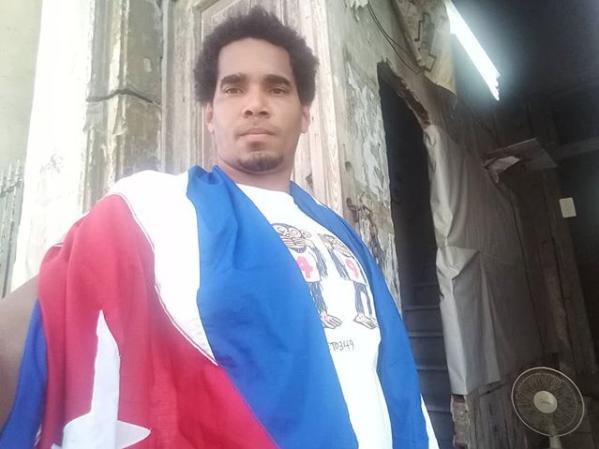The imprisoned Cuban artist and activist Luis Manuel Otero Alcántara has penned a new op-ed pleading for international support in the grassroots fight against his homeland’s communist government.
“On behalf of the young Cubans locked up in the island’s horrible prisons, I appeal to people of conscience around the world to support our struggle to liberate ourselves and our country,” Otero Alcántara wrote in the missive, published this week in the . “All we did was demand the right to choose our political future and to speak our minds.”
“No one should have to give up their youth for such a just cause,” he concluded.
Otero Alcántara, 34, was arrested on his way to a protest in Havana on July 11, 2021. He was held in jail until his hearing in June 2022, when he was sentenced to five years in prison on charges of contempt, public disorder, and promoting “insulting symbols of the homeland,” according to a statement released by the Cuban Attorney General’s office at the time. The announcement alluded to Otero Alcántara’s use of the Cuban flag during artistic performances.
The same day, Grammy Award-winning rapper Maykel Castillo was slapped with a nine-year sentence for similar offenses. Both men are leading members of Cuba’s San Isidro Movement activist group.
Among fellow artists and human rights activists, the punishments were widely seen as excessive and an example of the state’s increasing efforts to silence dissidents. Erika Guevara-Rosas, Americas director at Amnesty International, called the sentences a “shameful example of the human rights crisis caused by the Cuban government’s decades-long policy of repression.”
Ante los pronunciamientos sobre #Cuba que han realizado figuras de la política internacional, como @FranciaMarquezM, @lopezobrador_ , @Pontifex_es, Luisma enviará uno de sus días en prisión a cada uno de ellos, como parte de su obra “Retrato al Carbón del #GatoDeSchrödinger“. ? pic.twitter.com/K2TunUlXIR
— Luis M. Alcantara (@LMOAlcantara) March 18, 2023
For Otero Alcántara, the sentence capped a multi-year string of punitive actions levied against him by the government.
“They have been harassing me for years, arresting me 50 times between 2017 and 2021 and also through defamation, violation of privacy, threats, and police beatings,” he wrote. “But it wasn’t until the historic protest of 2021 that the regime decided to lock me up for a longer period of time so I could no longer communicate with my people.”
The artist went on to describe the conditions of his imprisonment at Guanajay, a maximum-security penitentiary southwest of Havana. He said that he has been separated from other political prisoners and only allowed to go outside occasionally. “I’ve lost weight because of the scarcity of food and poor quality of meals,” he added.
Spurred by shortages of food and medicine and the government’s handling of the COVID-19 pandemic, the 2021 protests were the largest seen on the island of Cuba in nearly 20 years. Though exact figures remain unknown, human rights groups have reported that more than 1,400 demonstrators were arrested, and that at least half of them remain behind bars. (In his op-ed, Otero Alcántara puts the number of arrests at over 1,800. “Of these, 897 have been tried, and 777 remain in prison,” he wrote. “Many are minors. Some have been sentenced to up to 30 years for sedition.”)
“Today, every young Cuban is a political prisoner. A censored artist. An exile inside and outside Cuba,” Otero Alcántara’s op-ed continued. “Even if you’re an accomplice of the system, you will inevitably be crushed like the others, because to be young is to be daring and reckless, eager to bring change to the world. It means fighting for love, dreams and utopia. But these qualities are considered crimes in Cuba, and that condemns us all to martyrdom.”
More Trending Stories:
An Israeli First-Grader Stumbled on a 3,500-Year-Old Egyptian Amulet on a School Trip

























